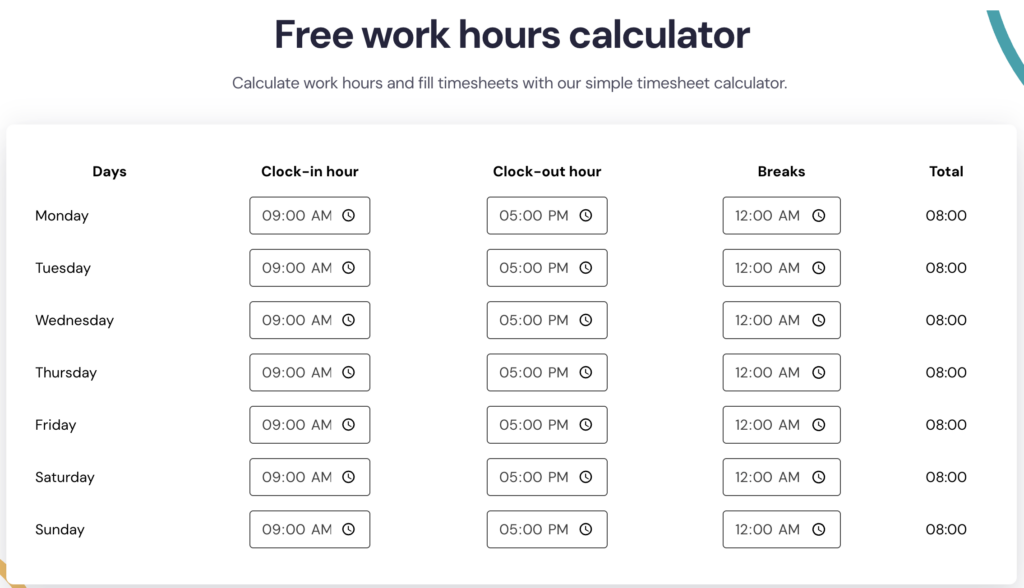Working hours refer to the number of hours an individual employee works for an employer. Ensuring employees work the right hours increases productivity, meets business objectives, and supports employee engagement and well-being. Not to mention the necessary legal compliance.
In this article, we examine what it means to use the term ‘full-time hours’ and explore why it’s essential to understand and know the hours our teams work.

Full-Time Hours: A Definition
In the UK, there is no legal definition of full-time working hours. Common practice or industry standards determine whether an employee is considered part-time or full-time.
However, according to Gov.uk, a full-time worker usually works 35 hours or more in one week.
Why Is It Important To Know Your Team’s Working Hours?
Knowing your team’s working hours and understanding how these hours affect their rights and their productivity is essential to business success for the following reasons:
Employee Well-Being and Engagement
If you understand your team’s working patterns and how this relates to any flexible working arrangements, you can support them with their work-life balance and help them if they are overworked or not challenged enough.
Workload Planning
Knowing your team’s working hours ensures you can create a schedule and allocate resources in a manner which makes the best use of each person’s availability while covering all requirements for the business needs. By avoiding employees being overworked or underutilised, companies can maximise productivity.
Sets Expectations
By clearly outlining the hours and expectations for an employee’s working hours, the employer sets expectations, making it easier to set objectives, manage performance, and track productivity. Clarity of working hours also helps teams understand when their colleagues will be working or not working, improving team morale and collaboration.
Legal Compliance
Knowing each team member’s working hours means employers can be confident they meet legal obligations on breaks, leave entitlements and benefits such as sick pay and pensions. The Part-time Workers (Prevention of Less Favourable Treatment) Regulations 2000 protect part-time workers from less favourable treatment than other workers.
Costs And Forecasting
Accurate knowledge of your team’s hours is essential for payroll calculations and supporting any deductions or benefits tied to specific contracts. This information also lets you be confident that payroll figures are accurate and can feed into forecasting and budgeting. Moreover, it’s important to calculate your team’s FTE (Full Time Equivalent) to understand your business’s needs. So identifying your team’s working hours is essential to properly budget.
Examples of Full-Time Employees
Many examples of full-time employees are available, but here is a small sample to illustrate how hours can vary. How breaks are taken and calculated within working hours will vary according to the role.
Office Administrator
Working hours: 9am-5.30pm Monday to Friday
Total hours: 37.5 hours per week
Registered Nurse
Working hours: three shifts per week 7am to 7pm
Total hours: 36 hours per week
Facilities Technician
Working hours: 8am to 4pm, Monday to Friday
Total hours: 40 hours per week
Retail Store Manager
Working hours: 9am-6pm, including some weekends
Total hours: 40 hours per week
Software Developer
Working hours: 9am-5pm, Monday to Friday
Total hours: 37.5 hours per week
Use our free time tracking calculator to monitor your team’s hours. With this tool, you can track breaks, log full-time hours for payroll, and forecast budget needs.
UK Full Time Hours FAQs
Still have questions regarding UK’s full time working hours? We’ve got you covered! Here’s some of the most frequently asked questions
Is 30 hours A Week Full-Time In The UK?
In the UK, an employee working 30 hours a week would usually be considered part-time, not full-time. However, this may vary depending on what the employer considers full-time hours. If full-time hours are 35 hours a week, a contract for part-time employment is usually less than 30 hours a week.
Is 40 hours A Week Full-Time In The UK?
In the UK, some employers will set their working week at 40 hours per week, although this is higher than the average.
If you are under 18, legally, you cannot work more than eight hours per day or 40 hours per week.
What Does Part-Time Mean?
Part-time means an employee works fewer hours than a full-time employee. These hours typically range from eight to 30 hours and may involve fewer or shorter shifts or days worked within a week. Examples of part-time roles include a retail assistant working 20 hours over four days, a teaching assistant working three days a week in a school, and a nurse working two shifts per week.
A part-time worker usually works fewer than 35 hours a week. A common number of hours worked for a part-time employee is 16.
What Is The Maximum Hours Somone Can Work In A Week?
The Working Time Regulations 1998 set a limit on the hours an employee can work in one week at 48 hours on average, when taken over a 17-week period. However, employees can opt out of this by agreement. There are also exceptions to this for roles such as the armed forces or emergency services.
If you are under 18, the law protects you from working more than 40 hours per week, regardless of whether you opt in.
Is It Hours Per Day, Per Week or Per Month?
Employers will use the period that is most relevant for their business. However, the custom is to refer to hours per week. For example, a job description will refer to 35 hours per week rather than 140 hours per month.
When employees need to record their hours, this may happen over a month or even a year for annualised hours contracts. Annualised hours are when an employee may work more hours over busy periods and fewer over quieter ones, as long as their total hours match an agreed annual figure.


